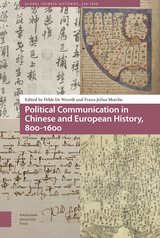
Between the sixth and twentieth centuries, the civil service examinations created and maintained political coherence across the Chinese polity. Preparation for the examinations transformed the lives of literate elites by defining educational standards and disseminating a language that determined elite status. However, as participation in the examinations became central to that status, an intense competition to determine the educational curriculum and the subject matter of the examinations erupted between intellectual and political rivals. The principal goal of this book is to explain the restructuring of the examination field during a critical point in its history, the Southern Song dynasty (1127-1279), which witnessed the increasing domination of the examinations by the Neo-Confucian Learning of the Way movement.
By analyzing textbooks, examination questions and essays, and official and private commentary, Hilde De Weerdt examines how occupational, political, and intellectual groups shaped curricular standards and examination criteria and how examination standards in turn shaped political and intellectual agendas. These questions reframe the debate about the civil service examinations and their place in the imperial order.

The occupation of the northern half of the Chinese territories in the 1120s brought about a transformation in political communication in the south that had lasting implications for imperial Chinese history. By the late eleventh century, the Song court no longer dominated the production of information about itself and its territories. Song literati gradually consolidated their position as producers, users, and discussants of court gazettes, official records, archival compilations, dynastic histories, military geographies, and maps. This development altered the relationship between court and literati in political communication for the remainder of the imperial period. Based on a close reading of reader responses to official records and derivatives and on a mapping of literati networks, the author further proposes that the twelfth-century geopolitical crisis resulted in a lasting literati preference for imperial restoration and unified rule.
Hilde De Weerdt makes an important intervention in cultural and intellectual history by examining censorship and publicity together. In addition, she reorients the debate about the social transformation and local turn of imperial Chinese elites by treating the formation of localist strategies and empire-focused political identities as parallel rather than opposite trends.

READERS
Browse our collection.
PUBLISHERS
See BiblioVault's publisher services.
STUDENT SERVICES
Files for college accessibility offices.
UChicago Accessibility Resources
home | accessibility | search | about | contact us
BiblioVault ® 2001 - 2024
The University of Chicago Press









